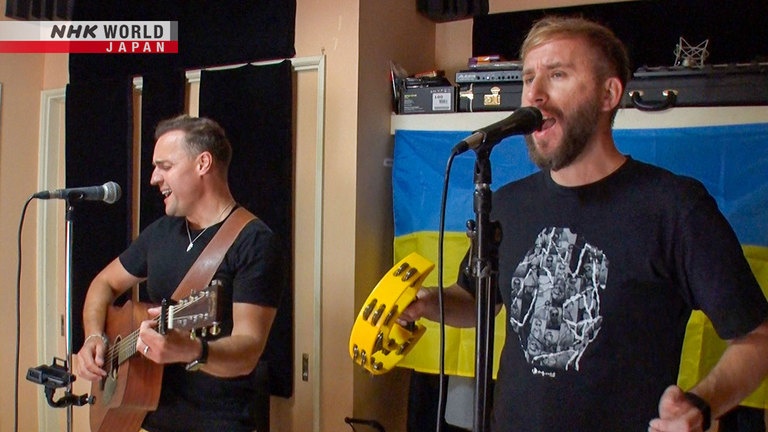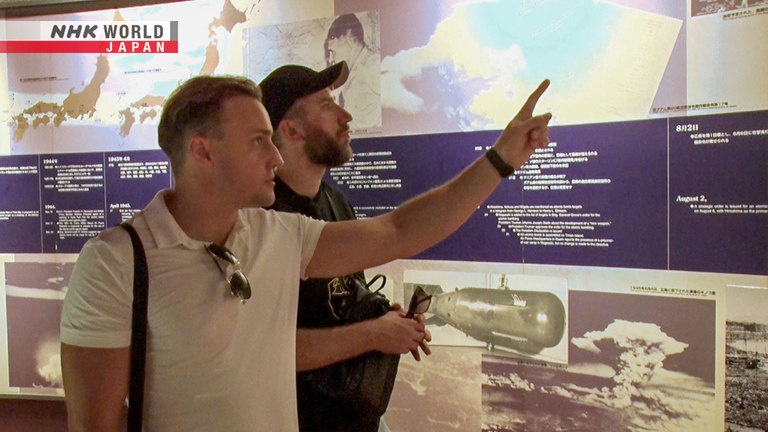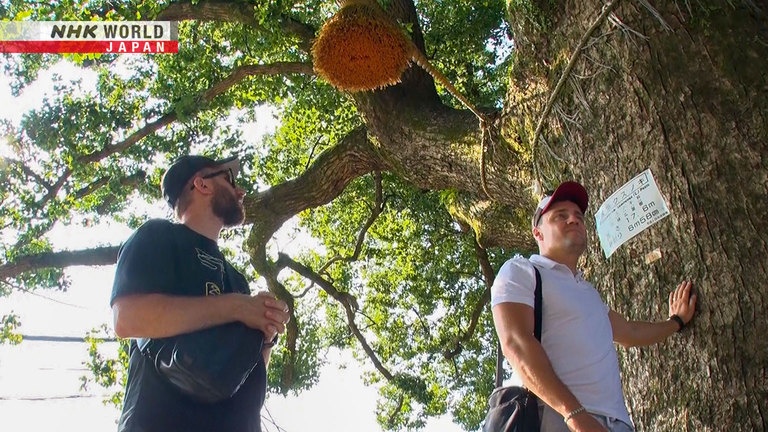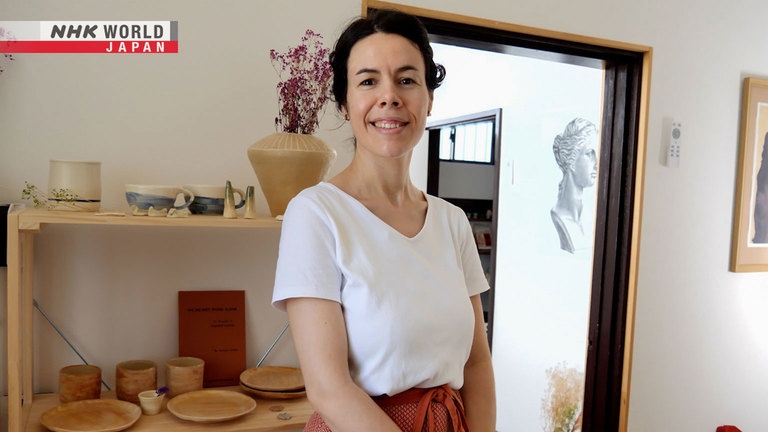Happiness Rests on the Clouds
We follow Alek Pashkowski and Vadym Bezvuliak, a Ukrainian music duo that's been entertaining audiences in Nagasaki Prefecture's Sasebo City since 2014. Though Russia's invasion of their homeland has brought many hardships, they've received support from the people of Nagasaki. To express their gratitude, Alek and Vadym are going to perform Ue Wo Muite Aruko, an iconic song from Japan's postwar recovery, at a local festival. We also visit Spanish-born Anna Fornieles Orti who runs a pottery school in Osaka.




Transcript
From Nagasaki, this Ukrainian duo called Maximum sings for peace to return to their distant homeland.
"Moon, may you shine brighter than ever."
"Light my way through the night."
"Guide me tonight to the one I love."
This beloved old Ukrainian ballad is about a man who longs for a faraway loved one.
"Dark clouds came to veil the moon."
"Guide me tonight to the one I love."
Both members of Maximum live in Sasebo City in Nagasaki Prefecture.
A flourishing port town throughout history, it's also an important location for the US Navy.
At this theme park that recreates the Netherlands' picturesque townscape...
...artists from various parts of the world entertain audiences.
Since 2014, Maximum have been performing here.
Vadym Bezvuliak and Alek Pashkowski got their break when they appeared on a TV talent show in Ukraine.
Impressed by their performances, the theme park invited them to come to Japan.
However, when Russia invaded their home country in 2022, they were unable to return.
The theme park's administration extended their contract and helped them settle down in Japan.
The duo donates part of their salary and the money they make from the sales of CDs to Ukraine.
Hang in there.
One woman yesterday after the concert, she brought this flower to us, and she bought five CDs.
She said, 'I want five CDs.'
And the next day, she said, 'I wanna buy one more... again five CDs.'
I'm surprised because we receive big support,
and big support from government, big support from just people.
I'm home!
Welcome back!
Alek's wife, Keiko, is Japanese.
Like doing surgery.
When he saw her among the audience, Alek says it was love at first sight.
They got married three years ago.
Daily news of the conflict in Ukraine worries Alek.
The Russian invasion of his home country has caused him much emotional distress and anxiety.
He stopped smiling. He was changed.
He no longer seemed happy.
One after another, people in Alek's community of adoption extended a helping hand.
With the assistance of Sasebo City, he was able to have his parents and nephew move to Japan last June.
His mother, Nataliia, was a chef back in Ukraine.
Today, she prepared borscht and other dishes from their native country.
Cheers!
Alek's parents work at one of the theme park's restaurants.
His nephew Alexander attends a Japanese high school.
He receives financial aid for his tuition and living expenses.
We've been treated so kindly
by everyone here.
I'm over sixty, and I'd never
seen such kind people before.
Vadym, the other half of Maximum, currently lives alone.
He too encouraged members of his family to flee to Japan.
However, his sister's husband is subject to conscription and cannot leave the country.
Refusing to go without her daughter, Vadym's mother decided to stay in Ukraine.
Though he's separated from his family, Vadym has found a small source of moral support.
I have, like, many letters.
The letters he receives from people who come to see their performances.
This is my favorite letters, because it's in the Ukrainian language.
'I wish for peace in the world, I wish for peace in Ukraine.'
When I got this, I wanted to cry.
It was, like, because when they gave us this, they were crying.
It touched my soul, touched my heart.
Hi!
Alek and Vadym have in their hearts nothing but gratitude for the people of Sasebo.
They were invited to perform at an event organized by the local chapter of the Junior Chamber International.
This will be an opportunity for the duo to express their thanks in song.
This is not work. This is passion.
This is our passion. It's a satisfaction.
- Do our best!
- Do our best!
What song would best convey their feelings?
After giving it much thought, the duo settles on an international hit
that dates back to the time of Japan's post-war recovery.
"Let's look up when we walk."
"Ue Wo Muite Aruko," or "Let's Look up When We Walk," released in 1961.
Known under the title of "Sukiyaki" in the US, it was covered by many artists in multiple languages.
So, this is... that means, I think, like the Ukrainian nation,
all the Ukrainian nation, all the way since the war has started:
looking up, and we never bend our head down, you know, so...
They'll perform the song in Japanese - a first challenge for them.
They use an alphabetized version of the lyrics to rehearse.
It's "kumo," not "komo."
And it's "shiawase wa," not "ba."
They make sure to consider the lyrics' meaning as they sing and to get the pronunciation right.
As they practice, one phrase in particular catches their attention.
I would like to understand why he's...
the writer of the song, using this kind of sentence like "shiawase wa kumo no ue ni."
What does it mean? I don't really understand.
It's kind of a very simple sentence for understanding,
but what the writer meant, like, for writing this lyric, it's like,
there is deep, much deeper information, a much deeper idea.
Today the two head out to Nagasaki City.
Hi! Nice to meet you!
Hi! I'm Mori!
To better understand the lyrics, they enlisted the help of Japanese teacher Mori Isaku,
who's been helping Alek's family, along with his father Taiichiro.
This is a symbol of peace for Nagasaki.
Father and son take Alek and Vadym to the Nagasaki Atomic Bomb Museum.
Taiichiro was one-year-old when the bomb fell.
The day of the bombing.
This clock forever indicates 11:02 a.m., the exact moment of the disaster.
In an instant, Nagasaki was leveled.
The bomb's blast and heat wave made countless victims.
Taiichiro wanted Alek and Vadym to see what Nagasaki was like back then -
when he and his family struggled to pull through.
I don't have words.
I don't know if it's correct, but 'It's horrible.'
Taiichiro then takes the duo to another place he wishes to show them.
These are the camphor trees
that survived the bomb.
These massive camphor trees are more than five hundred years old.
Though the bomb had practically killed them,
from their burnt trunks sprouted new shoots, miraculously bringing the trees back to life.
They became a source of encouragement for Nagasaki's recovery.
- It's like a miracle.
- It's like a miracle.
So, we believe that this has a power.
Give me power.
After the war, people desperately fought to get back on their feet and live life anew.
Taiichiro sees in the song a reflection of Nagasaki's strength and determination to live on.
"Happiness rests on the clouds."
"Happiness soars in the sky."
It took time for Nagasaki
to recover from the bomb.
In the 60s, it finally
began to grow economically.
We have to live with hope in our hearts.
Our dreams and hope can one day
blow the clouds away.
- Yeah, hope is the only thing to... can.... the hope...
- Hope is the only thing... survive.
...help us to keep walking.
I just kind of think, like, "ue wo muite," this kind of song helping us to achieve this hope together.
Because, listening to this song, you have wings, you can fly.
The day of the performance has arrived.
Alek's family and Isaku are among the audience.
For the occasion, Alek prepared a little speech in Japanese to express their gratitude.
With the war in Ukraine,
the people of our country...
are going through hard and painful times.
Happiness for the Ukrainians
rests on the clouds.
Ukraine's happiness soars in the sky.
One day, Ukrainians will see happiness.
Ukraine has received so much support
from Japanese people.
We do appreciate. Thank you so much. Thank you.
"Let's look up when we walk."
"So our tears don't fall."
"I remember those spring days."
"Tonight I'm all by my lonesome."
"Let's look up when we walk."
"Count the stars with tearful eyes."
"I remember those summer days."
"Tonight I'm all by my lonesome."
"Happiness rests on the clouds."
"Happiness soars in the sky."
"Let's look up when we walk."
"So our tears don't fall."
"I walk crying but my heart weeps."
"Tonight I'm all by my lonesome."
Thank you so much!
I'm so happy.
They made an effort to sing in Japanese.
I felt they sang for Japanese people.
It was great.
Their feelings came across.
I feel I want to do something to help.
Their song carrying a message of hope for their homeland, Alek and Vadym continue to look up as they walk.
The only thing I'm dreaming about is the end of the war.
And I'm dreaming about a peaceful life in Ukraine... and all over the world.
I really, really hope so.
Hi, I'm Anna Fornieles.
I teach pottery at my school.
Let me show you my work!
Ikuno, Osaka.
This shopping area retains
the atmosphere of old Osaka.
9:00 a.m.
arriving at work.
Anna opened her pottery school
a year ago.
While she and her partner run the school,
Anna works as the teacher.
Here they are! Hi!
10:00 a.m.
pottery trial class.
This local family are repeating
students of Anna's.
The grandmother found the school,
and the rest of the family joined.
- Try to make a ball.
- OK.
Pinch it with these fingers.
Like this.
How is it?
- Difficult.
- Right? But it's OK.
Tada! A cherry blossom.
Fashioning the clay connects
your hands and brain.
Little by little, you find a shape
you like as your creativity comes out.
The merit of my classes...
is that students can freely
create something they like.
- I like how this looks.
- Yeah, it's like a forest.
I made a bas-relief, like lotus flowers.
I'll bake them one more time,
and they'll be done.
It's fun to be creative.
- Like this.
- Thank you.
Anna does the final baking
to finish off their pottery pieces.
- Thank you so much!
- Thank you!
Growing up in Barcelona, Anna loved nature.
In her 20s, she trained at
a pottery school for 5 years.
She moved to Japan in 2019
to study Japanese pottery.
She worked as a tour guide
and visited potters nationwide.
But with the pandemic, she lost her income,
and had to quit pottery school.
Determined to continue doing pottery,
she asked her partner Ryo for advice.
I really wanted to find a way
for her to do pottery in Japan.
I'm a female-to-male transgender,
born a woman but living as a man.
She and I can't get married in Japan.
So, the solution we found to be together
was to start and run a business together.
Though Anna can't obtain a spouse visa,
she could get a business manager visa.
In 2022, as Ryo's business partner,
Anna opened her pottery school.
The two chose to live together in Japan.
- Ryo, this is Regina.
- Nice to see you.
Some students are tourists from abroad
and foreigners living in Japan.
Anna has taught over 50 students
from over 20 countries.
Of course, I'm happy when
I create by myself.
But getting feedback from students
makes me very happy, too.
Ryo is a web designer.
We're complete opposites.
- Like the north and south poles.
- Yes.
When I do web design work...
I want to work fast to earn more.
But now with Anna,
she often says, 'Take it slow!'
I learned to think carefully
when creating something.
She taught me that.
For me, Ryo is...
We have a saying in Spanish:
"The salt of life."
I'm the salt of your life?
It's nice. Thanks.
It's a good thing.
This is my treasure.
My first piece on
an electric pottery wheel.
I used Catalonian clay.
When I run into a wall in my work,
I look at this piece.
I think carefully about myself and I know
I'll find a solution to any problem.